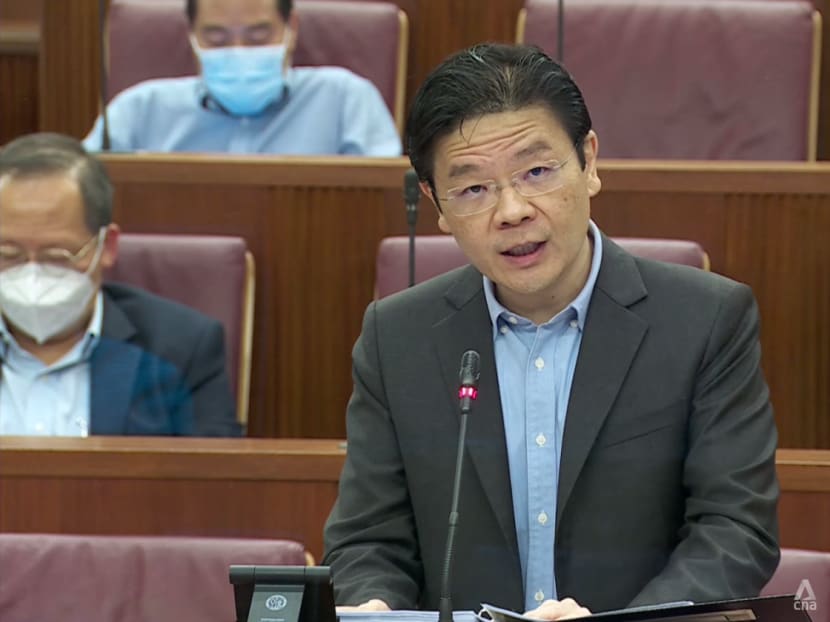Budget 2022 renews, strengthens social compact for Singapore, says Finance Minister Lawrence Wong

Finance Minister Lawrence Wong delivers the Budget 2022 statement in Parliament on Feb 18, 2022.
SINGAPORE: Finance Minister Lawrence Wong said on Friday (Feb 18) that Singapore must renew and strengthen its social compact for a post-pandemic world, as he outlined significant changes to Singapore’s tax system.
As anticipated, Mr Wong announced a hike in the Goods and Services Tax (GST) to 9 per cent, which came with a broad range of subsidies for low- and middle-income households.
The increase will be staggered over two years, beginning with a rise to 8 per cent on Jan 1, 2023 and then to 9 per cent on Jan 1, 2024.
He also unveiled new taxes on high-income earners, and wealth taxes for owners of investment properties and luxury cars.
Outlining the challenges facing the country, he said Singapore is entering a future where conditions are more volatile, the global environment more unpredictable and change more fast-paced than ever.
The Government expects an increasing shift in market rewards towards those with the highest skills and who are best able to take advantage of new technologies.
“This will make it harder to keep our growth inclusive and to hold our society tightly together,” he said.
Furthermore, Singapore is one of the fastest ageing countries in the world, with an “inexorable” rise in demand for healthcare and social care; and it must also join the effort to tackle climate change as this “affects our very survival”, Mr Wong said.
“The changes brought about by the pandemic, rising geopolitical contestation, climate change, as well as domestic issues like our rapidly ageing society – these are the defining challenges of our time,” said the Finance Minister. “They call for robust policy responses to reinforce our resilience and retool our capabilities for the future.”
More importantly, Singapore must continue to “stand united as one” to overcome these challenges, he said.
“This Budget is therefore about charting our new way forward together. It is a first step in renewing and strengthening our social compact for a post-pandemic world, and in realising our vision of a fairer, more sustainable and more inclusive society,” he said.
“It is about giving Singaporeans the confidence to embrace the change that lies before us, so that we grow into an ever stronger economy and nation, and an ever more secure society and home.”
MORE SOCIAL SPENDING OVER NEXT DECADE
Mr Wong said that Singapore has been able to keep public expenditure extremely lean, and government spending, excluding COVID-19 expenditure, stands at S$88 billion or 18 per cent of GDP – among the lowest in developed economies.
About 80 per cent of this is funded by taxes, while the remaining 20 per cent is from Net Investment Returns Contribution (NIRC). NIRC is a continuing stream of income from long-term expected returns generated by Singapore’s reserves and up to 50 per cent can be used by the Government.
“This fiscal approach has enabled us to keep our overall tax burden low,” he said, adding that half of Singapore’s workers do not have to pay income taxes.
“Put another way, for the quality of public services we have in healthcare, education, housing, transport and many other areas, the amount of tax our citizens pay is much lower compared to many developed countries.”
Singapore has also been adjusting its approach over the years, with the Government almost doubling social spending from S$17 billion to S$31 billion over the last decade. It now takes up nearly half of its annual Budget, and goes to subsidies for healthcare, education and support schemes for seniors and lower-wage workers.
Mr Wong assured Singaporeans that in the next decade, Singapore will “invest even more” its people and social infrastructure, and strengthen its system of “collective risk sharing”.
“We want to uphold that sense of obligation to each other, and strengthen the assurance that, whatever the challenges we face, we will always have each other’s back,” he said.
“These plans require additional spending. They reflect the need to respond to lasting structural shifts in our society, as well as our new social and environmental aspirations.”
Such spending will be recurring, and Singapore should not dip into its reserves to meet these needs. This is because the country needs to ensure that it has the reserves to deal with major crises, as well as provide a steady income stream for future generations, he said.
By 2030, government expenditure is expected to rise to more than 20 per cent of GDP, most of which will go to healthcare. There will not be enough revenue to cover these additional spending needs, as Singapore’s slowing labour force and GDP growth will constrain tax revenues. This is why the tax system has to be adjusted, he said.
“These tax adjustments will help to raise additional revenue and also contribute to a fairer revenue structure. That means everyone chips in and contributes to a vibrant economy and strengthened social compact, but those with greater means contribute a larger share,” said Mr Wong.
TAXES ON WEALTH, HIGH INCOME EARNERS
Mr Wong said that for personal income tax, there “is room for greater progressivity”.
From the 2024 assessment year, the portion of chargeable income above S$500,000 and up to S$1 million will be taxed at 23 per cent, and those earning more than S$1 million will be taxed 24 per cent on the portion of chargeable income above that amount. This is up from 22 per cent today.
On wealth taxes, Mr Wong said that they help to “recirculate” a portion of the wealth stock into Singapore’s economy and help mitigate social inequalities.
“Wealth taxes are therefore needed to build a fairer society where everyone can aspire to succeed regardless of their backgrounds.”
He said that while the Government would want to tax the net wealth of individuals, such a tax is not easy to implement effectively.
Singapore will continue to study the experiences of other countries and explore options to tax wealth, but in the meantime, it will strengthen the current system of taxes.
The Government will thus increase the property taxes for non-owner-occupied residential properties, which include investment properties.
The tax rate for such properties will go up, to between 12 and 36 per cent, up from the current 10 to 20 per cent. The increase will be higher for higher-value properties, said Mr Wong.
For owner-occupied properties, the rates will go up from today’s 4 to 16 per cent to 6 to 32 per cent for the portion of annual value above S$30,000. This will affect the top 7 per cent of owner-occupied homes.
The increase in property taxes will be implemented in two steps, starting from 2023.
Luxury cars will also be taxed at a higher rate. There will be a new Additional Registration Fee tier for the portion of the vehicle's open market value (OMV) in excess of S$80,000, which will be taxed at 220 per cent on the portion of the OMV in excess of S$80,000.
GST OFFSET MEASURES
To cushion the rise in GST, Mr Wong announced an Assurance Package which he said will cover at least five years of additional GST expenses for most Singaporean households. Lower-income households will receive more, with offsets covering about 10 years’ worth of additional GST expenses.
The Assurance Package had previously been announced to total S$6 billion, and on Friday, Mr Wong said the Government will top it up with another S$640 million.
These subsidies will be handed out over the next five years in the form of cash payouts, utility rebates, MediSave top-ups and Community Development Council (CDC) vouchers:
- Every adult Singaporean will get cash payouts of S$700 to S$1,600, depending on their income and property they own, from 2022 to 2026
- There will be additional cash payouts of S$600 to S$900 for less well-off Singaporean seniors from 2023 to 2025
- Eligible HDB households will get additional U-Save rebates
- Singaporeans aged 20 and below or 55 years and above will get a MediSave top-up of S$450 in total over 2023 to 2025
- There will be two rounds of CDC vouchers in 2023 and 2024, of S$200 each
The Government will also top up funds to the Citizens’ Consultative Committee ComCare Fund and self-help groups to support vulnerable households. The permanent GST Voucher scheme is also to be enhanced with a higher income threshold for the cash payouts and a larger quantum of up to S$500.
“This is why the GST increase will not hurt low-income households,” said Mr Wong.
To tide households, workers and businesses over the current period of higher prices, there will also be immediate help in the form of the S$500 million Jobs and Business Support Package and a S$560 million Household Support Package.
The household support will include top-ups to Edusave of S$200 for each child or student, more U-Save rebates for this year, and S$100 in CDC vouchers.
For businesses most affected by COVID-19 restrictions, like those in food & beverage sectors, retail, tourism and hospitality, small and medium enterprises will be getting S$1,000 per local employee, up to a cap of S$10,000 per firm.
The package will also provide for targeted assistance for the aviation sector, an extension of the Jobs Growth Incentive and enhanced loan schemes for businesses.
FOREIGN WORKER POLICIES TIGHTENED
Minimum qualifying salaries for foreign workers were also adjusted upwards among moves to tighten the inflow of workers, for both higher income Employment Pass holders and mid-level S-Pass holders.
For EPs, the minimum qualifying salaries for new applicants will go up from S$4,500 to S$5,000. For applicants from the financial services industry, this will be raised from S$5,000 to S$5,500.
S-Pass qualifying salaries are to go up from S$2,500 to S$3,000, also from September. There will also be a higher minimum qualifying salary of S$3,500 for the financial sector.
All these will take effect in September.
Mr Wong said that the salary for S-Pass applicants will be raised again next year and in 2025. A levy for such workers will be progressively raised, along with a tightening in quotas for S-Pass and work permit holders.
The Finance Minister also introduced a new Progressive Wage Credit Scheme (PWCS) to subsidise the wage increases of lower-wage workers from 2022 to 2026.
The Government will co-fund a proportion of the wage raises of workers earning up to S$3,000, to help businesses deal with the cost increase of rising wages.
Workfare Income Supplements (WIS) will also be raised and be given to more workers, with the qualifying age lowered to 30.
“Through the combination of Progressive Wages and Workfare, we expect the incomes of our lower-wage workers to grow faster than the median wage growth over the coming decade,” said Mr Wong.
“So as our economy grows and society progresses, we will reduce income disparities in our workforce.”
HIGHER CARBON TAX, HEALTHCARE RESTRUCTURING
On the climate change front, Mr Wong announced future revisions of the carbon tax rate and brought forward the country’s net zero emissions target.
Singapore’s carbon tax, currently at S$5 per tonne, will be raised significantly to S$25 per tonne in 2024 and 2025, it will then increase again to S$45 per tonne in 2026 and 2027.
This is with a view for the tax to reach S$50 to S$80 per tonne by 2030.
Singapore had committed to reducing its emissions to zero by the end of the century, but Mr Wong said that with advances in technology and new opportunities for international collaboration in areas like carbon markets, this can be brought forward.
“We will therefore raise our ambition to achieve net zero emissions by or around mid-century,” he said. The details will be finalised after consultation with industry and citizen stakeholders, he added.
Mr Wong also touched on healthcare and how related costs will increase significantly. Government healthcare spending has already tripled from 2010 to 2019, to S$11.3 billion in 2019.
While the Government must spend more on healthcare for Singaporeans, this current trajectory is not sustainable, he said.
“We therefore need to fundamentally rethink the way we deliver healthcare,” said Mr Wong.
This includes making care more accessible through a strong primary care sector, restructuring the system to centre around the patient, and improving partnerships between the healthcare clusters and community partners.
Mr Wong said that there will be a need for more “upstream investments” in preventive healthcare.
There should also be a stronger emphasis on mental health, with an interagency Taskforce on Mental Health and Well-being to co-ordinate efforts across agencies on this.
NO FURTHER DRAW ON RESERVES
Mr Wong updated the House that the Government now expects to use S$31.9 billion from past reserves for COVID-19 relief in the Financial Year 2020, and S$5 billion for FY2021.
For FY2022, S$6 billion will be set aside for COVID-19 defence, and President Halimah Yacob has given in-principle approval for this, said Mr Wong.
This brings the total expected draw on past reserves from FY2020 to FY2022 to up to S$42.9 billion, which is less than the initial draw of S$52 billion the President agreed to for FY2020.
For the last financial year, Mr Wong said the Government projects an overall deficit of S$5 billion or 0.9 per cent of GDP. He expects a deficit of S$3 billion or 0.5 per cent of GDP in the coming FY.
Ending his Budget speech, the Finance Minister said that Singapore has come a long way in its transformation and has overcome many challenges over the years.
“Looking back at what we have been through during these COVID-19 years, we have nothing to fear. We will always overcome. We will always prevail, so long as we continue to stand side by side in solidarity with one another, regardless of race, language or religion.” he said.
“We will chart a new way forward together. We will see through the pandemic today, and build a better Singapore tomorrow.”
Prime Minister Lee Hsien Loong said in a Facebook post on Friday that Budget 2022 will lay the basis for "sound and sustainable government finances, post-pandemic and beyond".
"We are building a greener and more sustainable city, transforming our economy to create good jobs for Singaporeans, expanding our healthcare system for an ageing society, and strengthening social programmes so that no one is left behind," he wrote.
"The Government needs reliable and adequate revenues to realise these long term goals."
The proposed Budget measures will be debated from Feb 28 to Mar 10 in Parliament.
Editor's note: This article has been updated to clarify the details on personal income tax rates.
Finance Minister Lawrence Wong said on Friday (Feb 18) that Singapore must renew and strengthen its social compact for a post-pandemic world, as he outlined significant changes to Singapore’s tax system. Sherlyn Seah tells us more.












